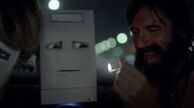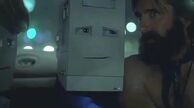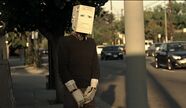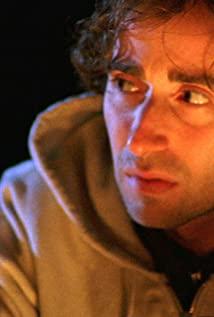He was a librarian, sluggish, had no friends, and his trousers were too short.
She's a beautiful baby, stylish, charming, and sticks notes everywhere.
They met.
They go to parties, to the forest, to live concerts. At the meeting, her left hand was broken, and he immediately took off his arm and took it up.
Later, her right leg was also broken, and he removed his own foot. She said, I have a choice, I don't want it. He said, you know, I had a dream, you lost a leg in the dream, they all want to find a leg for you, but you only want mine.
He hopped home on crutches, and the little mice she made were warmly placed in the house. Looking at these, he felt that everything was worth it, even, it was incomparable.
In the end she had another accident, and he went to the hospital, looking sadly at her unconscious on the operating table. He resolutely gave his body. Finally, she woke up, sitting in a wheelchair, holding his head in her arms, and the setting sun was gently streaming with warm light.
A simple story, a short film about love between robots.
At the beginning of watching the movie, I wondered why some of the "people" in the movie looked like real life, while our protagonist, like several other people, looked like an old computer mainframe? But then I thought, actually, what does it matter what it looks like? That's just a husk we got from our biological mother.
I think again, are these robots a metaphor for those who are lonely or even worse, people with psychological problems? It's just that the director didn't seem to give us an answer. Who knew that the robots here were abnormal, and those "human-like" people were normal? Maybe the opposite.
The director also did not give us an answer to another question. Why did the heroine keep having accidents, losing her hands and feet, and finally her body was broken into two sections?
Judging from her performance, she is a lively and fashionable person, is she too playful that something has happened? But the director just doesn't tell us why.
Maybe the director just wants to put the audience directly into a set container, she just broke her hands and feet, that's it. Or maybe it's useless to investigate why, this is the problem, this is existence. Like an elephant in an empty room.
The point is that the male protagonist gave his body without hesitation, from one arm to one leg, and finally gave her all the body, leaving only one head. (Obviously, a robot is different from a human. The source of human life lies in the heart, while a robot, or a computer, has its vitality in the host. So he did not die, but only had his last head.)
Why? I think the audience can't help but ask this seemingly simple question. because of love. Yes, because of love.
Ever since he met her and fell in love with her, he felt that life had an extraordinary meaning. Originally, he just worked mechanically day after day, charging when he was tired. And later he would greet others, full of life at work. This is change, this is what she brings to him, this is love. She changed his life, even in the eyes of outsiders, what a small change it was. So she was worth it, and he was willing to trade his body for her life.
And if it's going to kill him, I think he'll pay too. As the title of the film, i'm here, I am here. Where is it? In your hand in the wheelchair, in your heart. I have lived and loved, enough is enough, do not ask for possession, may you continue to live, live, and be happy.
This reminds me of a line in Fullmetal Alchemist - "As long as you live, life will come to an end one day. The body returns to the earth, flowers and plants grow on it, and the soul turns into memories and continues to live in people's hearts. Go on. Everything in the world is constantly passing and circulating, and so is human life." The point is, "The soul becomes a memory and continues to live in people's hearts." If this is a beautiful soul .
Such a commitment may become a myth in today's society of metal fatigue consumerism and serious self-cultivation. However, we sing praises for family love, in which parents can give without expecting anything in return, and even give their lives for us (which is reflected in so many natural and man-made disasters), why can't love? Why don't we believe in love anymore? If it is you, you have to ask that heart, can you do it? What do you love? Who do you love? Or, do you really love it? Are you in love?
---------------------- A little addition ------------------------- -------
I feel that many people are scolding the heroine in the film, saying that she is too "forceful", "Shenzhenxing", harming others and harming herself, and so on. What I want to say is:
First, there is a big gap between Chinese and Western concepts. When we stand in our own cultural context to evaluate things in another cultural context, it will inevitably be a bit too subjective. We often say that people can't fully understand another person, or even themselves. For the same reason, we can let go of this kind of incomprehension first.
I have read such a story (a true story). The story is about an American woman who was married three times and had several children, but all three husbands died and several children seem to have gone (can't remember this). In China, such a woman will definitely not escape being crowned with "Kofuke's life", or blame herself to death, but the client herself never complains, she said that she thanked God (let alone her religious beliefs) for letting her have Live those experiences, let her love those people, this is life. Right, this is life. The parties didn't think what was wrong, what are we bystanders scolding in a hurry?
When it is too bland, we ask for ups and downs, and when it is too bloody, we will feel exaggerated. What kind of face does life want? In the final analysis, whatever is life, this is life.
Besides, if this heroine can play such a disgusting performance, it means that the director and the actors have performed the role very well. Just like everyone loves the male protagonist.
In literature, in addition to directly depicting the truth, goodness and beauty to impress the audience, sometimes it also deliberately depicts falsehood and ugliness to make people feel that it is wrong, vulgar, sinful and depraved. Do more thinking (say Baudelaire's The Flower of Evil?). Of course, this is not to say how fake and ugly the heroine is. It's just that we scoff at this heroine for being self-willed or grumbling, at least we already have a general understanding of what to do in our own hearts. That's fine, the next step is to practice it, to love, to be loved. right?
View more about I'm Here reviews











